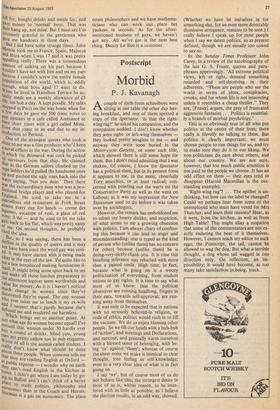Postscript
Morbid
P. J. Kavanagh
Acouple of sixth-form schoolboys were sitting at our table the other day hav- ing breakfast, and one of them spotted a copy of the Spectator. 'Is that the right- wing rag?' he asked his companion, and the companion nodded. I don't know whether they were right- or left-wing themselves they looked pretty wingless to me — and anyway they were soon buried in the Motor-cycle Gazette, or some such title, which showed there is still some hope for them. But I don't mind admitting that I was shaken. Of course, I know the Spectator has a political slant, but in its present form it appears to me, in the main, cheerfully Tory anarchist, or at least radical; con- cerned with pointing out the warts on the Conservative Party as well as the wens on Labour; as it was my impression the New Statesman used to do before it was taken over by sociologists.
However, the remark has emboldened me to admit my hearty dislike, and suspicion, of what seems to me a growing obsession with politics. I am always chary of confess- ing this because it can lead to anger and misunderstanding: one is typed as the kind of person who (unlike them) has no concern for others because (unlike them) he is doing-very-nicely-thank-you. It is time this insulting inference was rebutted with more than a pained smile. High time, in fact, because what is going on is a woozy politicisation of everything, from student unions to gay rights. It is time to say what most of us know: that the political obsessives are running headlong, fingers in their ears, towards self-approval; are run- ning away from themselves.
It was only to be expected that in nations with no seriously believed-in religion, or code of ethics, politics would rush in to fill the vacuum. We do so enjoy blaming other people. So we fill our heads with a hub-bub of 'action', and meetings and Declarations, and rancour, and generally warm ourselves with a blessed sense of belonging, with be- ing `us' against 'them"; whereas of course the sheer noise we make is inimical to clear thought, true feeling or self-knowledge; even to a very clear idea of what is in fact going on.
I say 'we', but of course most of us do not behave like this; the strongest desire in most of us is, within reason, to be inter- fered with as little as possible; as I believe the election results, in an odd way, showed.
(Whether we have let ourselves in for something else, for an even more detestably dismissive arrogance, remains to be seen.) I really believe I speak up for most people 'when I say Ave detest politics, as at present defined, though we are usually too cowed to say so.
In the Sunday Times Professor John Carey, in a review of the autobiography of the late G. S. Fraser, quotes and para- phrases approvingly. 'All extreme political views, left or right, demand something retarded and self-deceiving in their adherents. "These are people who see the world in terms of plots, conspiracies, crooks, and for whom life is not interesting unless it resembles a cheap thriller." They are, [Fraser] argues, the prey of frustrated aggressive fantasies ... Politics is essential- ly a branch of morbid psychology.'
This is so obviously true of all who put politics at the centre of their lives; there really is literally no talking to them. But politics is clearly important; we must choose people to run things for us, and try to make sure they do it to our liking. We non-politicians do care about others, and about our country. We are not sure, however, that too much public attention is not paid to the people we choose. It has an odd effect on them — their eyes tend to disappear (Harold Macmillan is the out- standing example).
'Right-wing rag'? ... The epithet is un- thinking, but how can the label be changed? Could we perhaps hear from some of the unemployed who must have voted for Mrs Thatcher, and learn their reasons? Hear, as it were, from the kitchen, as well as from High Table? This might allay a suspicion that some of the commentators are not ex- actly enduring the heat of it themselves. However, I cannot teach my editor to suck eggs; the Postscript, the tail, cannot be allowed to wag the dog. But what a terrible thought, a dog whose tail wagged in one direction only. On reflection, an im- possibility; it would have become, as too many take satisfaction in being, stuck.


































 Previous page
Previous page